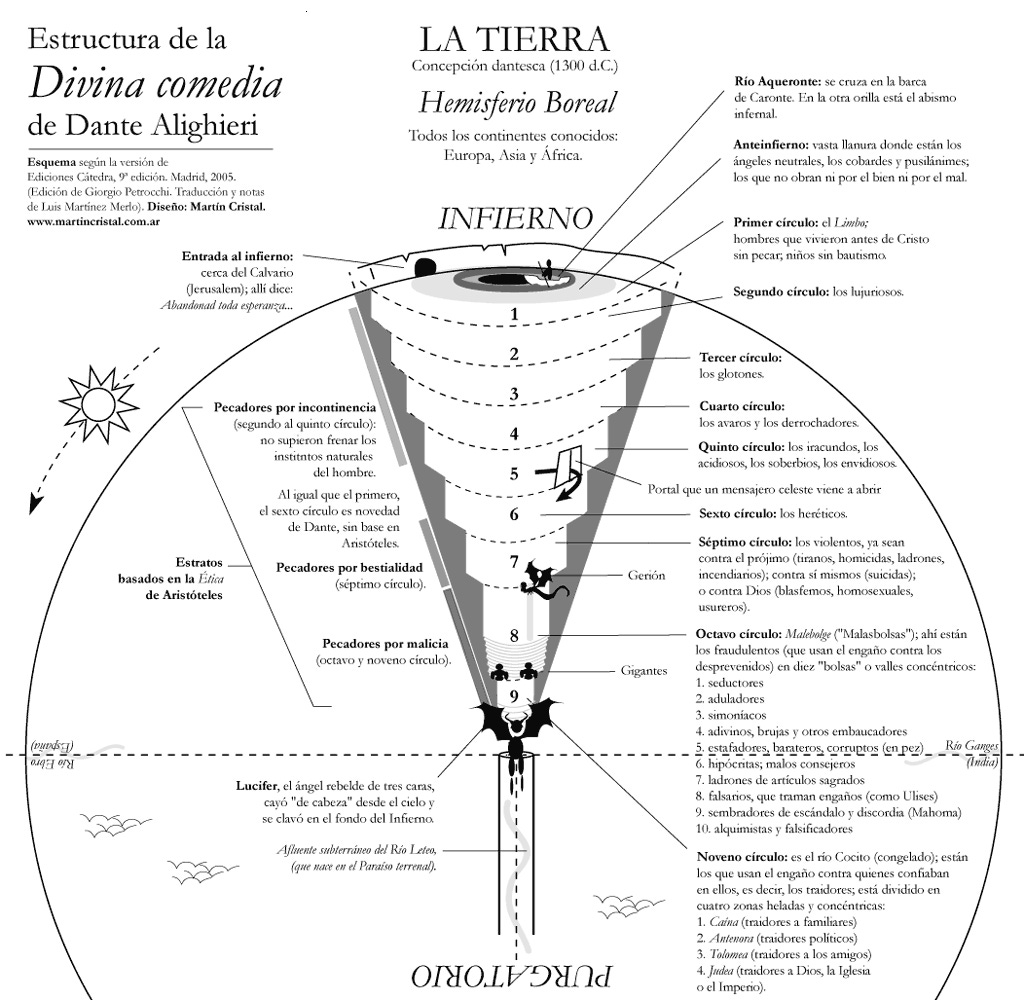Dante Alighieri’s Divine Comedy
As little flowers, which the chill of night has bent and huddled, when the white sun strikes, grow straight and open fully on their stems, so did I, too, with my exhausted force
The Divine Comedy is a poem composed of an introductory chant and three parts: Hell, Purgatory and Paradise. Each part consists of thirty-three chants, of little more than a hundred verses each. The poem’s composition dates are much discussed: most likely, Dante began it around 1307, and later worked on it all his life.
The poet intended to make the “Divine Comedy” primarily a work of doctrine and edification, a Summa that comprised the knowledge of his time, from science to philosophy and theology. That is why the poem is full of allegorical and moral meanings.
Extraterrestrial World Architecture
Under the earth’s crust opens in the boreal hemisphere, just below Jerusalem, a deep cone-shaped depression that reaches the center of the earth. It was brought about by the fall of Lucifer, the rebellious angel, who, in effect, is nailed to the bottom of the abyss. The lands that jumped during the fall of the angel converged in the southern hemisphere to form an island consisting of a conical mountain on top of which the Earthly Paradise is placed, exactly in the antipodes, therefore, of Jerusalem, and on the extreme frontier between the world of matter and that of immateriality.
In the depression, which sinks in new concentric circles, lies Hell. The damned are scattered in these circles in harmony with the gravity of sins; and sin is all the more serious the more the man violates God’s law.
On the conical mountain of the southern hemisphere is Purgatory. The souls are distributed over the ravines that dig into the flank of the mount. Seven are are the zones corresponding to the seven deadly sins; with antipurgatory and Earthly Paradise the fateful number nine is reached, which with number three lies at the base of the whole disposition of the Divine Comedy. The two kingdoms are linked by a narrow underground that leads from the bottom of the infernal abyss to the island of Purgatory in the opposite hemisphere.
Paradise lies naturally in Heaven: where nine spheres circle with even larger orbits and faster movement around the stationary Earth, according to the Ptolemaic system. Above them, the blazing Empyre, where God shines, surrounded by the blissful triumphs.
Dante drifted into a dark jungle from where he struggles to climb a hill. A panther, a lion and a wolf oppose him. Virgil appears, inviting him to visit the eternal realms to avert those dangers, guiding him through Hell and Purgatory, and then handing him over to Beatrice, who will lead him to Paradise. Dante accepts
Hell
Leave, you who enter, all hope!
Halfway through his life, Dante, having lost his way in a dark forest, unsuccessfully tries to climb a luminous hill: three beasts, which symbolize human lust, hinder his step. Virgil appears to the poet and proposes to him another way to reach the contemplation of God (the luminous summit), a rough and terrible path that crosses the kingdoms beyond the tomb.
In hell, the hottest places are reserved for those who choose neutrality in times of crisis
Purgatory
Dante is invigorated and continues the journey with a resolute spirit
Emerge an instinctive breath of relief in the emergence of the “dead aura” and the rediscovery of the “sweet sapphire oriental color” above him, in the Sky. Thank God, everything is different in Purgatory: the landscape, the atmosphere, the light that rains from above. The hatred, the rebellion and the crime are gone. While the infernal characters were viscerally linked to life lived on earth, to the sins that were still to be relived and would live for eternity, the penitents of Purgatory, far from earthly vicissitudes, are eagerly inclined to their future union with God. The tragedies suffered on Earth are long gone, transfigured: it no longer make the heart beat.
Paradise
Come on: the journey is long and requires haste
Paradise is the song of the beatitude, of the consonance of the will of the blessed with that of God. It is also the song of theological dissertations, of the scholarly explanations that Dante receives from his lady and from other elect. But above all it is the song of light, a light that shines, radiates, flames, throbs wherever it may be, upon the figures of the blessed, in Beatrice’s eyes, upon the spheres that move in the heavens, and which becomes the more blinding the more one rises to the vision of God.
[Translated from here]







